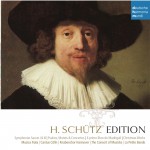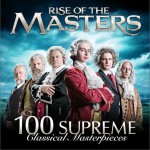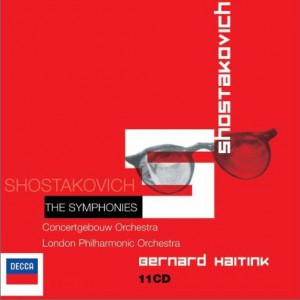標簽:
專輯文案:(聲明:文案均由授權方提供,并不表示一聽贊同其立場或觀點)
Contrary to what some people have deduced, this Haitink set is not new. It is a reissue of the old Decca set from years ago at a new reduced price in time for the Shostakovich Centenary. The recordings were made from the mid-1970s to the mid-1980s. If what you really want is all of Shostakovich's symphonies by one conductor in one set, this is still a contender -- hence the 4 stars, especially given the reduced price. But I would recommend buying the symphonies individually instead, and I will offer some specific suggestions.
Haitink's first recordings were with the London Philharmonic Orchestra (Symphonies 1, 2, 3, 4, 7, 9, 10 and 15). Later he began to record with the Royal Concertgebouw Orchestra of Amsterdam (Symphonies 5, 6, 8, 11, 12, 13, and 14). The RCOA is a better orchestra, and the symphonies recorded with the RCOA are generally better than those recorded with the LPO. That's one way to begin considering buying individual symphonies.
Another important consideration is that not all of Shostakovich's symphonies are equally good -- in fact, they are much more uneven than Beethoven's, Bruckner's or Mahler's, just to mention some great forerunners in the category of symphonic cycles. The great DSCH symphonies are No.s 4, 5, 8 and 10. No.s 1, 2 and 3 are really not essential -- the 1st was a beginner's exercise, and No.s 2 and 3 were revolutionary propaganda pieces. In general, the others can all be considered to be second or third tier -- I prefer No.s 7, 9, 11 and 14 over No.s 6, 12, 13 and 15, but I concede that at this level of ranking subjectivity increases. Both No. 11 and No. 12 are post-Stalin pro-Soviet exercises, the 11th commemmorating the failed revolution of 1905, and the 12th celebrating the Bolshevik revolution of 1917. Both No. 13 and No. 14 feature vocals, modeled on Mahler's Das Lied von der Erde (Song of the Earth), which fused song and symphony forms.
So clearly the first priority is to hear the best available versions of Shostakovich's best symphonies, No.s 4, 5, 8 and 10. Of those, Haitink ranks only for No. 8. I prefer the now out-of-print recording by Solti and the Chicago Symphony Orchestra, but Haitink and the RCOA are a close second (see my review). So definitely start there! Haitink's No. 5 (paired with No. 9) is excellent, another good choice (see my review). I would place it alongside the Mravinsky/Leningrad Philharmonic, Gergiev/Kirov Orchestra, and Rostropovich/LSO recordings (see my reviews of all three). My top choice for the Fifth, though, is Rostropovich with the National Symphony Orchestra, a 1983 recording on DG that is now available as an import (see my review). Haitink's 4th, with the LSO, has clearly been superceded -- my top choice is Jarvi/Scottish National Orchestra on Chandos, a 1989 recording (strange, admittedly, but Jarvi was a student of Mravinsky!). Gergiev's recent recording is also excellent. As for the 10th, I hate to admit it, but Karajan's 1981 recording for DG with the Berlin Philharmonic is clearly superior to all contenders. (I object to Karajan on both ideological and musical grounds.) Sanderling and the Berlin Symphony Orchestra on Berlin Classics is a good second choice.
As for the rest, Gergiev's recent 7th with the Kirov is outstanding (see my review). Both Haitink and Gergiev present solid 9ths -- I prefer Haitink's interpretation, but the sound on the more recent Gergiev recording is much better (see my reviews). Rostropovich and the LSO perform an amazing live 11th (see my review). Haitink and the RCOA are brilliant on the 14th, which includes the equally superb "Poems of Marina Tsvetayeva."
That's enough for one review! See my SHOSTAKOVICH: A LISTENER'S GUIDE list for more of the great Dmitri Shostakovich.
Haitink's first recordings were with the London Philharmonic Orchestra (Symphonies 1, 2, 3, 4, 7, 9, 10 and 15). Later he began to record with the Royal Concertgebouw Orchestra of Amsterdam (Symphonies 5, 6, 8, 11, 12, 13, and 14). The RCOA is a better orchestra, and the symphonies recorded with the RCOA are generally better than those recorded with the LPO. That's one way to begin considering buying individual symphonies.
Another important consideration is that not all of Shostakovich's symphonies are equally good -- in fact, they are much more uneven than Beethoven's, Bruckner's or Mahler's, just to mention some great forerunners in the category of symphonic cycles. The great DSCH symphonies are No.s 4, 5, 8 and 10. No.s 1, 2 and 3 are really not essential -- the 1st was a beginner's exercise, and No.s 2 and 3 were revolutionary propaganda pieces. In general, the others can all be considered to be second or third tier -- I prefer No.s 7, 9, 11 and 14 over No.s 6, 12, 13 and 15, but I concede that at this level of ranking subjectivity increases. Both No. 11 and No. 12 are post-Stalin pro-Soviet exercises, the 11th commemmorating the failed revolution of 1905, and the 12th celebrating the Bolshevik revolution of 1917. Both No. 13 and No. 14 feature vocals, modeled on Mahler's Das Lied von der Erde (Song of the Earth), which fused song and symphony forms.
So clearly the first priority is to hear the best available versions of Shostakovich's best symphonies, No.s 4, 5, 8 and 10. Of those, Haitink ranks only for No. 8. I prefer the now out-of-print recording by Solti and the Chicago Symphony Orchestra, but Haitink and the RCOA are a close second (see my review). So definitely start there! Haitink's No. 5 (paired with No. 9) is excellent, another good choice (see my review). I would place it alongside the Mravinsky/Leningrad Philharmonic, Gergiev/Kirov Orchestra, and Rostropovich/LSO recordings (see my reviews of all three). My top choice for the Fifth, though, is Rostropovich with the National Symphony Orchestra, a 1983 recording on DG that is now available as an import (see my review). Haitink's 4th, with the LSO, has clearly been superceded -- my top choice is Jarvi/Scottish National Orchestra on Chandos, a 1989 recording (strange, admittedly, but Jarvi was a student of Mravinsky!). Gergiev's recent recording is also excellent. As for the 10th, I hate to admit it, but Karajan's 1981 recording for DG with the Berlin Philharmonic is clearly superior to all contenders. (I object to Karajan on both ideological and musical grounds.) Sanderling and the Berlin Symphony Orchestra on Berlin Classics is a good second choice.
As for the rest, Gergiev's recent 7th with the Kirov is outstanding (see my review). Both Haitink and Gergiev present solid 9ths -- I prefer Haitink's interpretation, but the sound on the more recent Gergiev recording is much better (see my reviews). Rostropovich and the LSO perform an amazing live 11th (see my review). Haitink and the RCOA are brilliant on the 14th, which includes the equally superb "Poems of Marina Tsvetayeva."
That's enough for one review! See my SHOSTAKOVICH: A LISTENER'S GUIDE list for more of the great Dmitri Shostakovich.
本專輯因版權原因或者內容問題不提供試聽與下載.
專輯《Shostakowich Symphonien CD 1-11 No. 1 In F Minor, Op.10; Symphonie No.3, Op》的歌曲列表
| 序號 | 歌曲 | 播放 收藏 歌詞 下載 |
| 01 | Largo. Allegro Molto. | |
| 02 | Allegretto - Allegro Non Troppo | |
| 03 | 'My Shli, My Prosili Raboty I Khleba' | |
| 04 | Allegro高清MV | |
| 05 | Moderato | |
| 06 | Lento | |
| 07 | Allegro高清MV | |
| 08 | Allegro Molto - Lento - Allegro Molto | |
| 09 | Allegretto高清MV | |
| 10 | Allegretto - Allegro | |
| 11 | Andante | |
| 12 | Andante. Allegro | |
| 13 | Allegro - Largo | |
| 14 | Moderato: 'V Pervoye Pervoye Maya' |
古典音樂的精選專輯
-
 瓦格納盛宴 ——紀念瓦格納誕辰200周年 播放整張專輯 2014-09-19
瓦格納盛宴 ——紀念瓦格納誕辰200周年 播放整張專輯 2014-09-19 -
 Dvorák: Piano Quintet Op. 81 / String Quartet Op. 96 德沃夏克:鋼琴五重奏 Op81/弦樂四重奏 Op96 播放整張專輯 2013-07-05
Dvorák: Piano Quintet Op. 81 / String Quartet Op. 96 德沃夏克:鋼琴五重奏 Op81/弦樂四重奏 Op96 播放整張專輯 2013-07-05 -
 Heinrich Schütz Edition 播放整張專輯 2013-07-15
Heinrich Schütz Edition 播放整張專輯 2013-07-15 -
 2013維也納美泉宮夏季音樂會 播放整張專輯 2013-06-19
2013維也納美泉宮夏季音樂會 播放整張專輯 2013-06-19 -
 尼伯龍根的指環?精選 Der Ring des Nibelungen THE HIGHLIGHTS 播放整張專輯 2013-05-22
尼伯龍根的指環?精選 Der Ring des Nibelungen THE HIGHLIGHTS 播放整張專輯 2013-05-22 -
 100 Supreme Classical Masterpieces: Rise of the Masters 播放整張專輯 2010-11-30
100 Supreme Classical Masterpieces: Rise of the Masters 播放整張專輯 2010-11-30 -
 帕海貝爾:卡農絕贊 播放整張專輯 2013-03-22
帕海貝爾:卡農絕贊 播放整張專輯 2013-03-22 -
 醉笛 播放整張專輯 2013-03-18
醉笛 播放整張專輯 2013-03-18

